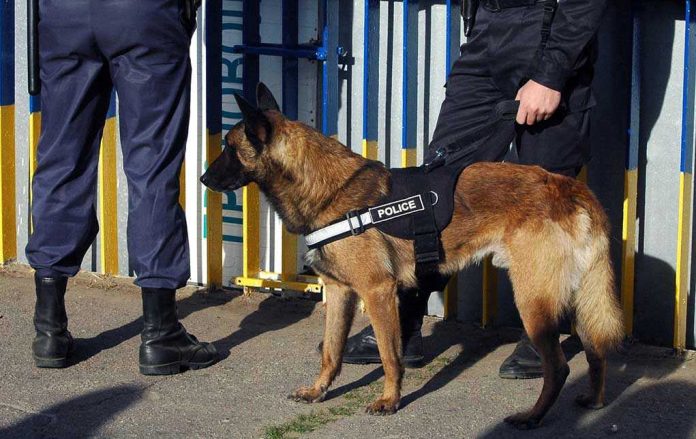
After six years sniffing out drug traffickers at America’s front door, a legendary Border Patrol dog is hanging up his badge…
At a Glance
- Milan, a German Shepherd working at the ports of Miami, retires after intercepting over 400 pounds of illegal drugs.
- The dog’s retirement highlights the physical toll on canine officers and the crucial role they play in border security.
- Paws of War steps in to ensure Milan’s transition to civilian life after years of service protecting American communities.
- CBP continues to invest in canine detection teams as border security remains a national priority.
A Hero’s Service at America’s Drug Pipeline
At the ports of Miami, where drugs from Latin America have poured in for decades, border security is a daily, grinding battle. Milan, an eight-year-old German Shepherd, spent six years patrolling this high-pressure front, working alongside handler Michael Schwank. Together, they intercepted over 122 pounds of marijuana, 253 pounds of cocaine, 45 pounds of ecstasy, and 5 pounds of methamphetamine before Milan’s recent retirement due to intervertebral disc disease, a spinal condition common in working dogs. These numbers represent more than just seizures—they’re a reminder of the daily fight to keep our communities safe from the destructive consequences of illegal narcotics, a fight that’s never been harder amid years of lax enforcement and open-border lunacy.
Border Patrol dog retires after stopping more than 400 pounds of illegal drugs from entering US https://t.co/Uun0ob9HhS pic.twitter.com/dQJYrsyeBz
— New York Post (@nypost) July 26, 2025
The ports of Miami have long been a favored target for traffickers exploiting loopholes and overwhelmed resources, especially as family-focused, law-abiding Americans watched the previous administration all but roll out the welcome mat for criminals and cartels. Milan’s daily grind—sniffing through mountains of cargo and countless travelers—required not just physical endurance but total, unbreakable focus. It’s the kind of work that doesn’t make headlines when it goes right, but everyone notices when it goes wrong, as communities across the country reel from the fallout of failed drug policy and border mismanagement.
Retirement Brings New Challenges—and A Spotlight on Service Dogs
Milan’s retirement wasn’t a victory lap—it was a necessity. Years of service took their toll. Handler Michael Schwank said about Milan “all he wanted to do was work,” a testament to the bond and drive that defines America’s best canine officers. The reality is, these dogs pay a steep price for their dedication. Intervertebral disc disease, arthritis, and other musculoskeletal issues are all too common, forcing early retirement and difficult transitions. Thankfully, organizations like Paws of War have stepped up, pushing back against bureaucratic indifference to ensure retired service animals get the care and respect they deserve. Robert Misseri, representing Paws of War, hailed Milan as a “highly respected canine” and is now leading efforts to secure him a loving home.
This situation shines a harsh light on a system that too often leaves its heroes behind. While the left obsesses over “equity” and panders to every special interest group under the sun, it’s fallen to private organizations and patriotic Americans to honor those—human and canine—who actually keep the country safe. If only the same urgency shown to illegal newcomers was applied to veterans of all stripes, maybe we’d have a system worthy of their sacrifice.
Canine Teams: Still the First and Best Defense
Milan’s record is not unique among canine teams, but it is extraordinary—demonstrating exactly why CBP has institutionalized their use since 1986, with more than 530 teams deployed nationwide. The ports of Miami, a historic bottleneck for drugs and illegal entries, have seen countless high-profile seizures thanks to these working dogs. Studies confirm the breed’s unmatched olfactory prowess and trainability, making German Shepherds a mainstay in America’s security apparatus. Despite technological advances, even the most sophisticated chemical sensors haven’t replaced the intuition and reliability of a well-trained K-9.
The success stories of Milan and his peers only underscore the need for continued investment. After years of open borders, rampant abuse of asylum and visa programs, and a culture of coddling criminals, Americans are demanding results—not more broken promises and empty slogans. Every ounce of narcotics stopped at the border is a victory for law, order, and families struggling under the weight of addiction, crime, and government neglect.
The Road Ahead for Border Security and Canine Service
As Milan trades his uniform for a well-earned retirement, the stakes at the border remain sky-high. The physical and emotional toll on both human and canine officers is real, and the need for robust support—during and after service—has never been more apparent. The current administration has made it clear: no more open border games, no more putting the safety of Americans last. Canine detection teams will remain a cornerstone of border security, but their success depends on more than just funding—it requires a cultural shift back to common sense, accountability, and unapologetic defense of American sovereignty.
The nation cannot afford to take its eye off the ball, not when traffickers adapt and exploit every weakness. Milan’s story is a call to action—a reminder that security isn’t just policy, it’s people and animals on the front lines, doing the work the radical left spent years undermining. If we want to reclaim our borders and protect our families, we start by backing those who do the job, day after day, no questions asked.







